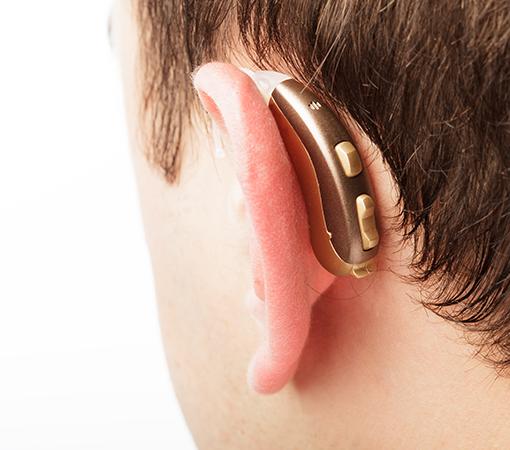Many forms of hearing loss are genetic. They are often hereditary and caused by gene mutations that cause hearing loss in several ways.
Inner ear sensory hair cells play a vital role in our hearing, and mutations in these cells can prevent them from functioning properly, resulting in hearing loss.

Genetic factors also make some people more susceptible to hearing loss than others. It is estimated that the causes of age-related hearing loss are 35-55% genetic. Genes make them more predisposed to hearing loss due to ageing or induced by noise, drugs or infections.
Hereditary hearing loss causing hearing impairment include Otosclerosis, Usher’s syndrome and Pendred syndrome.
Gene mutations may cause several non-hearing related, hereditary conditions combined with a deformation of the inner ear, resulting in deafness at birth or later in life.
ENVIRONMENTAL FACTORS
Other common and environmental factors that may damage or lead to loss of the hairs and nerve cells in your inner ear are –
- Aging – degeneration of delicate inner ear structures occurs over time.
- Loud noise –exposure to loud sounds can damage the cells of your inner ear. Damage can occur with long-term exposure to loud noises, or from a short blast of noise, such as from a gunshot.
- Heredity –genes may make one more susceptible to ear damage from sound or deterioration from aging.
- Occupational noises –jobs where loud noise is a regular part of the working environment, such as farming, construction or factory work, can lead to damage inside the ear.
- Recreational noises –exposure to explosive noises, such as from firearms and jet engines, can cause immediate, permanent hearing loss. Other recreational activities with dangerously high noise levels include snowmobiling, motorcycling or listening to loud music.
- Some illnesses –diseases or illnesses that result in high fever, such as meningitis, may damage the cochlea.
Also, some medications and drugs such as the antibiotic gentamicin and certain chemotherapy drugs, can damage the inner ear.
Temporary effects on your hearing could be ringing in the ear (tinnitus) or hearing loss which can occur if you take very high doses of aspirin, other pain relievers, anti-malarial drugs or loop diuretics.
SYMPTOMS
Signs or symptoms of hearing loss and when to see a doctor –
- Muffling of speech and other sounds
- Difficulty understanding words, especially against background noise or in a crowd of people
- Trouble hearing consonants
- Frequently asking others to speak more slowly, clearly and loudly
- Need to turn up the volume of the television or radio
- Withdrawal from conversations
- Isolations in social settings
Hearing Solutions owns 37 years of experience in treating clients to suit individual requirements. Hearing aids clinic in Hyderabad that offers a range of assistive hearing aids and devices for every kind of hearing loss. Hearing devices are customized accordingly for our clients.

